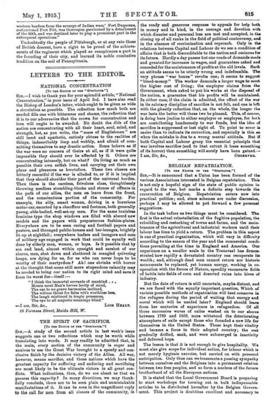THE SPIRIT OF SACRIFICE.
[To not Eamon or Tax ..S.C1.17014”1
SI12,—A study of the second article in last week's issue suggests one or two reflections which may be worth while translating into words. It may readily be admitted that, in the main, every section of the community in eager and anxious to see the Great War brought to a speedy and con- clusive finish by the decisive victory of the Allies. All war, however, means sacrifice, and those nations which have the greatest capacity for suffering and enduring and sacrificing are most likely to be the ultimate victors in all great con- flicts. What indications, then, do we see about us that we possess this capacity ? In many directions, we may thank- fully conclude, there are to be seen plain and unmistakable manifestations of it. It can be seen in the magnificent reply to the call for men from all classes of the community, in the ready and generous response to appeals for help both in money and in kind, in the courage and devotion witk which disaster and personal loss are met and accepted, in that closing up of all ranks in the field of political controversy, and in the absence of recrimination and reproach. Only in the relations between Capital and Labour do we see a condition of affairs that is both discreditable to the nation and ominous far its future. Hardly a day passes but one reads of demands made and granted for increases in wages, and guarantees asked and conceded for the maintenance of profits at the old levels. Bock an attitude seem, to be utterly wrong and indefensible. The very phrase "war bonus" revolt's one; it seems to suggest "blood-money." The worker demands a larger wage to meet the higher cost of living; the employer claims from the Government, when asked to put his works at the disposal of the nation, a guarantee that his profits will be maintained. In either case, if the claim is admitted, the effect of the war in its salutary discipline of sacrifice is not felt, and one is left with the ghastly reflection that, on the whole, the longer the war lasts the better will these two be pleased. This, of course, is doing bare justice to either employer or employee, for both are contributing handsomely to war fonds, but the idea of sacrifice is suppressed or lost sight of. To point to error is easier than to indicate its correction, and especially is this so when the mistake is due to a wrong mental attitude. But if both Capital and Labour grasp the essential principle that war involves sacrifice (and to that extent it loses something of its horror) then something will surely have been gained.—


































 Previous page
Previous page